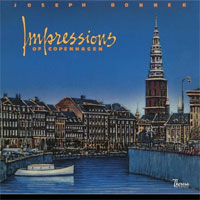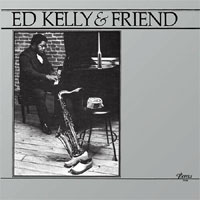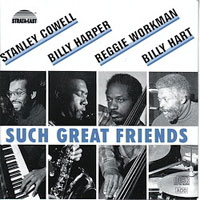Joseph Bonner • Impressions of Copenhagen
Ed Kelly & Pharoah Sanders • Ed Kelly & Friend
Stanley Cowell, Billy Harper, Reggie Workman & Billy Hart • Such Great Friends
ure Pleasure has been reissuing jazz, blues and rock recordings since 2004, when jazz and blues fans finally got their chance to buy well-pressed remasterings of classic titles by Charles Mingus and Otis Spann originally released on the Candid label. Over the last fifteen years, Pure Pleasure has reissued titles from artists like Nat King Cole, Louis Armstrong, Duke Ellington and hard-to-find labels like Pacific Jazz, Blue Horizon and Storyville. Pure Pleasure has been the first to bring recent material from Cassandra Wilson, previously only available in digital form, to vinyl. Rather than compete with the larger reissue labels that can afford to license blockbuster titles, Pure Pleasure has tended to gravitate to niche artists, and its current passion is picking releases from Strata-East, Nimbus and Theresa Records, small labels that issued jazz during the last quarter of the twentieth century. Many readers will never have heard of Theresa Records, which operated out of El Cerrito, California, probably in the owner’s garage or spare bedroom. It released 27 LPs between 1975 and 1982, and its artist roster included Pharoah Sanders, Idris Muhammad, John Hicks and George Colemen. The Theresa catalogue was purchased by Evidence Music, and many of the titles have remained in circulation as CDs. Charles Tolliver and Stanley Cowell founded Strata-East Records in New York in 1971, releasing almost 60 LPs and over 30 CDs, by artists Tolliver, Cowell, Cecil Payne, Pharoah Sanders, Billy Harper and Cecil McBee. Like Theresa Records, Strata-East was a pioneer in the release of artist-produced recordings. Unlike Theresa, Strata-East survives to this day, but the heyday of both labels was during the 1970s, long before the Internet made it easier to market artist-produced music and before the invention of the CD cut the cost of producing and distributing physical media. The three titles considered here are examples of the music produced by the two labels, music that flew well under the radar of all but the most committed jazz fans. Pianist Joseph Bonner's main influence was McCoy Tyner. Bonner released over a dozen albums, mostly on the Steeplechase label. He worked with top jazz artists, including Roy Haynes, Pharoah Sanders and Freddie Hubbard, and played as sideman on many well-known recordings. A classically trained musician, Bonner returned from time spent in Europe to settle into the Denver jazz scene until he passed away in 2014. Impressions of Copenhagen is Bonner’s best-known and best overall session as a leader and includes four numbers he composed and arranged for a nine-piece band, along with "Quiet Dawn," composed by Cal Massey. In addition, this reissue includes a bonus take on "Lush Life" not included on the original album. The orchestra adds strings, horn and flute to a rhythm section. Bonner plays both piano and (overdubbed) chimes. The album opens with the title song, which sounds like it could have fit in with a Pharoah Sanders session. "The North Star" features agile solos from Bonner and bassist Paul Warburton. The session closes (except for the addition of "Lush Life”) with an up-tempo romp on "Why Am I Here?" It does raise the question, however, of how such talent never broke larger on the jazz scene. Big-band music gasped its last breath during the heyday of Gil Evans, to be revived in the 21st century by Maria Schneider and a few others. Bonner kept that spirit alive in the interim. If you enjoy big-band music, this is a slice of jazz history you won’t want to pass up. The session was recorded at Northstar Studios in Boulder, Colorado, in good but not exceptional sound. Ed Kelly is another piano player who never created waves at the national level but made his mark in the local jazz scene of San Francisco and Oakland. A lifelong resident of Oakland, he taught music at Laney College for a quarter century and was a legend among his students. When big-name stars performed at Yoshi's or another Bay Area clubs, he would often be asked to play piano. In 1978, he recorded this session with his frequent collaborator Pharoah Sanders, who was under contract to Arista Records. Hence, Sanders is identified as “friend” and rather than seeing his photo on the cover, you see his horn, hat and shoes. Sanders, who shot to fame as part of John Coltrane’s late group, has remained popular in the 21st century, his records still cherished and his performances packed. The album is a mix of jazz quartet, sometimes with a string and horn band added, and once with voices thrown into the mix. One duet and one piano solo fill in. The recording opens with "Pippin," soul music from a Broadway play arranged by Kelly, that sounds like Isaac Hayes will bust out in song at any moment. Next up is the Kelly ballad "Answer Me My Love." A full band supports some of Sanders’ most beautiful playing. The Sanders anthem "You’ve Got To Have Freedom" and Kelly’s solo on "Sweet Georgia Brown" complete side one. Side two opens with "Rainbow Song," a Kelly composition sounding a bit like cocktail jazz, but all is forgiven with the second track, "Newborn," where Sanders burns down the house, supported by full band and voices. The album closes with Sanders and Kelly's powerful duet of Sam Cooke’s "You Send Me." Recorded at Bear West Studios and Hyde Street Studios in San Francisco by Mark Needham (best known for his recordings of Chris Isaacs), Ed Kelly & Friend sounds clean and the instruments well fleshed out. This is one of the best Theresa Records releases. The most obscure title of the lot is Such Great Friends. Recorded in 1983, it was first released in 1991 on CD only. It’s not that the tapes were passed over -- nothing was being issued in 1983, because Strata-East's heyday was in the late 1970s. Cowell decided to put the business into hiatus at the end of the 1970s, resurrecting it in 1990 with a series of CDs. This LP is the first issue of the music in almost 30 years and the first vinyl issue. The album does not identify a leader of the session. While none of the four collaborators was a superstar, each was an important figure in the jazz scene of the last half of the twentieth century. Strata East co-founder Cowell recorded with most of the avant-garde artists of the time, but was also comfortable playing alongside more traditional musicians such as J.J. Johnson. Saxophone great Harper worked with Art Blakey and Art Roach, and recorded extensively for Strata-East, Black Saint and Steeplechase. Drummer Billy Hart has played with everyone. The group knew the material well, as they had performed it on tour in Japan during the Spring of 1983. "Sweet Song," composed by Cowell, opens with an extended piano solo, and when the band joins in a third of the way through, the song maintains a mellow flow suggested by the title. Billy Harper’s "Destiny Is Yours" closes side one, bringing a bit more fire to the session. The song was already familiar to jazz fans, as Harper had released it as the title song of his 1989 Steeplechase debut. "Layla Joy" gives Billy Hart’s drum kit a bit more spotlight. Reggie Workman’s 17-minute "East Harlem Nostalgia" features an opening solo by Workman and extended tenor solo by Harper. Except for the material being recorded at A-1 Sound Studios in New York, a studio owned by Atlantic Records co-founder Herb Abramson, little is known about the session. It’s a decent recording with good instrumental spread. Of the three Pure Pleasure LPs considered here, Such Great Friends is the most approachable of the lot, a straight-ahead quartet date. On the other hand, none of the four tunes catches fire, and Strata-East junkies may find it a bit tame, not measuring up to their expectations for the label. Whatever your taste in music, you cannot accuse Pure
Pleasure of cherry-picking only well-known titles for reissue. Its emphasis is on keeping
its catalogue fresh while also producing LPs that audiophiles seek out. No reissue label
does this better. |



